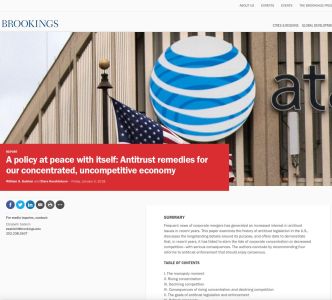Join getAbstract to access the summary!

Join getAbstract to access the summary!
William A. Galston and Clara Hendrickson
A Policy at Peace with Itself
Antitrust Remedies for Our Concentrated, Uncompetitive Economy
Brookings Institution, 2018
What's inside?
When it comes to company size, how big is too big?
Recommendation
The rise in mergers and acquisitions since the 1990s has brought consolidation to a wide variety of industries and companies in the United States. But evidence suggests that the trend has had negative impacts: concentrating profits among fewer firms, raising prices for consumers and throwing roadblocks in front of smaller, more innovative competitors. This important essay by policy experts William A. Galston and Clara Hendrickson suggests several paths toward boosting antitrust practices. getAbstract recommends its cogent analysis to those concerned about how the drift toward consolidation affects future US economic growth.
Summary
About the Authors
William A. Galston is a senior fellow and Clara Hendrickson is a research intern at the Brookings Institution.






















Comment on this summary